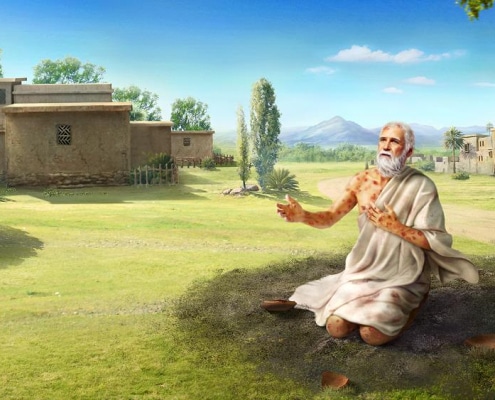
Is There a Supernatural ‘‘Satan’’?
We take a look at some of the passages that same would take us too that seem to speak of a supernatural satan, but do they? The Bible does use the word ‘satan’ and ‘the devil’ but let us look at these passages and see what or who they refer?’
Firstly the word ‘satan’ is a Hebrew word transliterated into our English Bible, this means that the translators saw this word in the Hebrew and chose to leave it in the Hebrew rather than translating it into it’s English equivalent meaning of ‘adversary’ or ‘opposer’. Straight away upon discovering this would should have alarm bells ringing in our heads as to why they would do this? But on a closer look we find it is actually worse than this as we discover that the translators have only chosen to transliterate this word into our English Bible when it seemed to them that it might refer to something that they already believed in ie. A supernatural evil being. We find that in most places where it is clearly not talking about such a thing they have translated it correctly to the English ‘adversary’.
Let us now look at some of the passages where the translators have chosen to transliterate this Hebrew word into our English Bible. We need to start with the Old Testament because ‘satan’ (though never ‘the devil’) is mentioned there in a way that on first reading might seem to support such a belief in a supernatural evil.
In the Old Testament there are two clear examples where someone called ‘Satan’ appears, but when you think about the background to the story it is clear that ‘Satan’ is a character in a kind of drama set in a tribunal, or a court of law. In these ‘dramas’, ‘Satan’ represents the opposition to God’s ways that was coming from men and women at the time. Real situations are described in a dramatic way, as in a play.
Satan in the Book of Job
 Job was the most godly person of his time. He was also very rich and powerful. It was natural for envious minds to suggest that Job only served God because God rewarded him with the good things of this life.
Job was the most godly person of his time. He was also very rich and powerful. It was natural for envious minds to suggest that Job only served God because God rewarded him with the good things of this life.
The ‘sons of God’ (Job 1:6) are worshippers of God: we are not told whether they are angels or humans.
A character called Satan appears in the early scenes of the drama (the first two chapters of the book) to challenge Job − that is, to be a ‘satan’ (or adversary) to him. Satan makes his suggestion openly, and God gives him the power to test this out. Then, in plainer language from chapter 3 onwards, we see how Job trusted in God and survived the test, in spite of his friends who echo Satan’s accusations.
It seems that it was their envy that had been dramatised in the earlier chapters. For, in chapter 42:11 his family console him for all the trouble that the LORD had brought upon him.
The Satan character, having played his part, has disappeared, and the friends are reconciled when Job prays for them.
In Isaiah God says:
I form the light and create darkness, I make peace and create calamity; I, the Lord, do all these things (Isaiah 45:7).
The idea of a rival god who is responsible for evil is quite wrong.
Satan in Zechariah Ch. 3
This prophetic book was written at a time when Jerusalem was being rebuilt after it was destroyed by the Babylonians. There was much opposition from Samaritan people who were transported into the area after the Jews were taken away. In the purpose of God, however, this opposition would be defeated, and the rebuilding of the Temple would succeed. Ezra chapter 4 describes this in plain language. Zechariah 3 is a vision which shows this contest in the form of another play or drama. Here the Satan character represents the opposition from these Samaritans, who would be ‘rebuked’ by the angel of God. The High Priest would then change his working clothes to Priest’s robes, and the Temple services would start again.
This was the meaning at the time.
More importantly, the chapter is also a wonderful prophecy of the crowning of Jesus as our perfect High Priest. Jesus was born about 400 years later. The Hebrew name ‘Joshua’ means the same as ‘Jesus’.
Both names mean ‘Yah shall save’, (‘Yah’ is a short form of God’s name ‘Yahweh’).
Joshua’s garments were soiled – building is dirty work. This represented human nature which as we have seen is ‘dirty’ stuff. When Jesus was here he had the same nature as we do, but because he always pleased God he was raised to life again with God’s nature – like the High Priest changing his robes for clean and splendid ones.
Satan tempts Jesus
Now we go to the New Testament to see how Jesus’ temptations are shown in the same dramatic way – Jesus versus the devil or satan.
These temptations of Jesus are recorded in three Gospels (Matthew 4:1-11; Mark 1:12-13; Luke 4:1-13)
which shows how important they are. If we forget what the Old Testament tells us about temptation, they do seem to say that an evil super-human being visited Jesus. But here we have one more Bible ‘drama’.
Remember − when we asked where opposition to God comes from, the answer in plain (not picture) language was always “from human nature”. Jesus shared this nature. Look at Luke 4:6, where the devil showed Jesus all the kingdoms of the world in a moment. This could only happen in his own mind, because even from space you can only see half of the world.
This satan offered Jesus all the glory of these kingdoms:
Then the devil, taking him up on a high mountain, showed him all the kingdoms of the world in a moment of time. And the devil said to him, “All this authority I will give you, and their glory; for this has been delivered to me, and I give it to whoever I wish. Therefore, if you will worship before me, all will be yours.”
And Jesus answered and said to him, “Get behind me, Satan! For it is written, ‘You shall worship the LORD your God, and Him only you shall serve’ ” (Luke 4:5–8).
Notice that the tempter says “this has been delivered to me, and I give it to whoever I wish”. Just ask the question:
“Who has the world been promised to, and who has the right to share it with others?” The answer is in
Psalm 2:8-9:
“8 Ask me, and I will make the nations your inheritance, the ends of the earth your possession.
9 You will break them with a rod of iron; you will dash them to pieces like pottery.”
Luke 22:28-30:
“28 You are those who have stood by me in my trials. 29 And I confer on you a kingdom, just as my Father conferred one on me, 30 so that you may eat and drink at my table in my kingdom and sit on thrones, judging the twelve tribes of Israel.”
Revelation 2:26-27:
“26 To the one who is victorious and does my will to the end, I will give authority over the nations—27 that one ‘will rule them with an iron scepter and will dash them to pieces like pottery’ z—just as I have received authority from my Father.”
The world has only ever been promised to Jesus, and he was so sure of it that he promised his followers a share in it.
This temptation therefore was in his own mind, as were the others. Temptations came into Jesus’ mind because of his human nature, but he always overcame them by recalling the words of God. This is the example that he gives us, showing how we too should resist temptation.
By John Woodall
![]()

